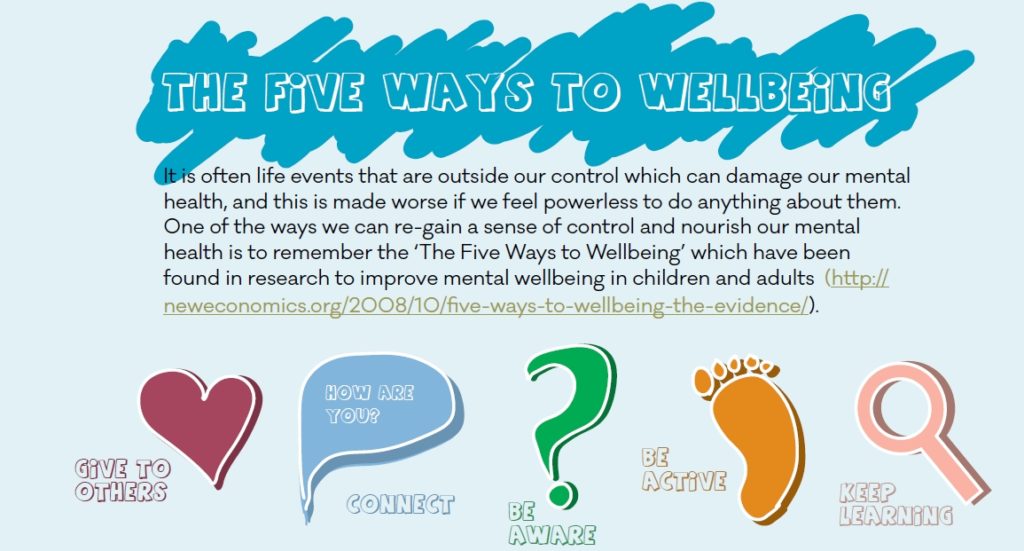How can you support your child’s Mental Health?
Mental health and mental illness are part of a ‘spectrum’, just as physical health and illness are. Throughout our lives, many different things can lead us to move up and down the spectrum such as the start or end of relationships, getting a new job or being made redundant, changes in physical health and good news or worries about those we are close to.
It is important to remember that recovery is possible, even from severe mental ill health, and that people with a mental ill-health diagnosis may be managing their condition well and still experiencing high levels of well-being.
Often, life events that are outside our control can damage our mental health, and this is made worse if we feel powerless to do anything about them.
One of the ways we can re-gain a sense of control and nourish our mental health is to remember ‘the five ways to well-being’ which have been found in research to improve mental well-being in children and adults.

Top tips for how you can support your child’s mental health
Day to day:
Our everyday habits are important to our mental health, just as they are to our physical health. Here are a few suggestions to help your child develop good habits.
- Think about the five ways to well-being
- Are there things you can encourage them to do, or do together, each day?
- Talk openly about mental health
- Just as you might encourage them to eat fruit and veg to keep their bodies healthy (and model this behaviour yourself), talk openly about, for example, staying connected with others or being physically active in order to take care of our minds.
- Model good habits – Children often learn from copying what they see around them. If you are taking care of your own mental health, it’s easier for them to see what good habits look like.
- Think about phone usage – both theirs and yours. We don’t fully understand the impact of social media on our mental health but using phones and laptops can impact on our sleep, which is important to our mental health. We’re also more likely to listen to one another if we’re not distracted by technology.
- Notice any changes in your child’s behaviour -Young people tell us how they’re feeling in many ways, not always verbally. Learning what is normal for your child makes it easier to notice when things change, and if this might be a sign that they’re struggling
- Look out on the school newsletter for our monthly well-being family activities
Click here to download the full guide for parents and carers:
https://www.mentalhealth.org.uk/publications/make-it-count-guide-for-parents-and-carers
Where can you go for support?
- Speak to a member of staff in school who will direct you to an appropriate member of the team
- Visit your GP and discuss your concerns
- Speak to the school health nurse
See below to try a bedtime relaxation story and ideas and benefits of Family Yoga
reach 4 wellbeing website family yoga bedtime relaxation